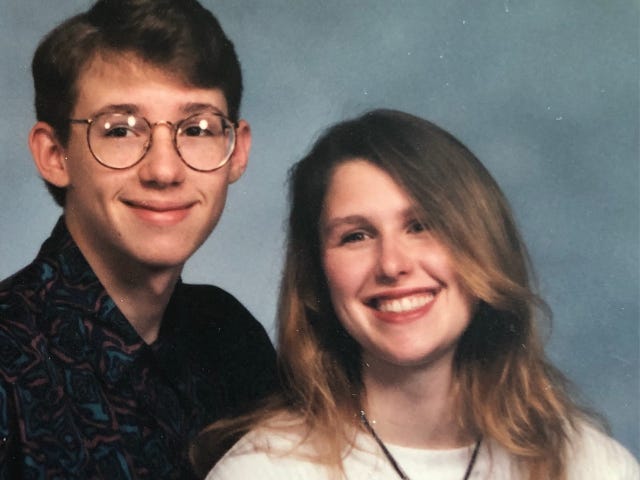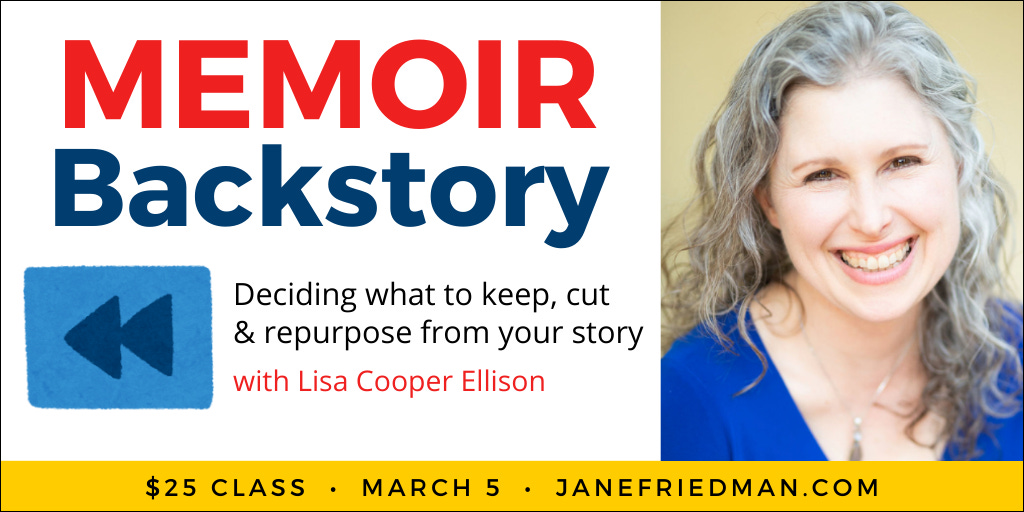The Limits of Empathy and the Power of Grief
How Writing, Connection, and Laughter Help Us Carry the Uncarryable and Support Others as They Do the Same
Welcome new subscribers to the Writing Your Resilience Substack. My name is Lisa Cooper Ellison. I’m the trauma-informed writing coach behind this Substack, and I’m here to offer inspiration, craft advice, and strategies to help you regulate yourself as you create art that changes lives. If you’ve been here for a while, welcome back. It’s good to see you.
Last Saturday marked the twenty-eighth anniversary of my brother’s suicide. Sometimes, I feel like what my friend Lynn Shattuck calls a “grief granny”—not just a crone, but someone carrying a loss so old it seems fossilized, at least to the uninitiated.
But as Amy Lin, author of Here After, said during our interview on The Power of Micro Memoir, “Grief is an experience that exists out of time, and no matter how many years pass, it can still feel soon.”
Last year, the immediacy of my grief manifested as a snot-bubble-cry dance party at AWP. During the 2017 AWP Conference, I cried alone at the end of a long, busy day. This year’s anniversary also took place amid a writing conference—this time in San Francisco—but there were no tears, just heaviness and a deep desire to be alone.
On the afternoon of February 8th, I bought a gluten-free cookie in the Ferry Building and walked along the bay, while paying close attention to the life happening around me: the saxophone player, eyes slack, back arched in blissful union with his music; the pop-up drag queen, outfitted as the Statue of Liberty, performing in the median, her body seemingly heavy with fatigue as mascara dripped dramatically from her eyes; the children exuberantly running and laughing along the sidewalk; and the low-riders blasting Tupac in an impromptu car show.
The night before, I’d skipped a couple of events to dine with a friend. We pee-your-pants laughed until they kicked us out of the restaurant. She texted me the next morning, saying how much she much she’d needed it. I told her about how our night prepared me for this anniversary, then shared a photo of the Bitch Crystals another dear friend sent me, which didn’t just make my day but my entire month.
On the way to the airport early Monday morning, I regretted not taking a photo with her. But how do you photograph a laugh mid-moment if you’re the one laughing? You don’t. You stay with it and let it feed you.
So, what does this have to do with writing?
During Saturday’s lunch, Isle McElroy, the nonbinary author of The New York Times bestseller The Atmosphereans, gave a powerful talk on the limits of empathy, and how they explored this concept in their most recent work, People Collide.
Empathy, as Brené Brown states, is the act of nonjudgmentally taking another’s perspective and feeling with them. It’s an essential component of memoir writing. Empathy allows you to connect with a former version of yourself and engage with it so thoroughly you settle the question, “what happened to me?” and uncover the deeper one your readers need you to answer. Empathy for other characters helps you create fully rounded human beings on the page whose behaviors don’t occur in a vacuum. The more you engage in this work, the more your readers trust you.
However, as Isle points out, there’s a dark side to empathy: we can empathize too much or for the wrong reasons. Consider the empath in a narcissistic relationship who constantly tries to understand their abuser and uses their insights to justify staying or explain away harmful behaviors—something Dr. Ramani Durvasula and I discussed during our interview for her New York Times bestselling book, It’s Not You: Identifying and Healing from Narcissistic People.
In Isle’s latest novel, People Collide, a husband and wife swap bodies in a twist on the Freaky Friday trope. But instead of fully understanding each other, they simply come to understand themselves in a new context.
That has been my experience too.
I’ve spent years writing about my brother, seeking to understand the boy I once knew and the reasons behind his tragic end. In some ways, my relationship with him feels more real and stronger now than it did when he was alive, and the pain and dysfunction of our lives frequently kept us apart.
Yet, what I know about him is filtered through my lens—a point of view imposed on a silent partner who can never verify my version of events. All I can grasp is how my life has transformed because of his death and how it serves me now.
When I delve into the timeless vault of our story and reflect on the lessons most pressing to my current life, here’s what emerges: Writing helps me survive hard things. It shows me how to sit with what Eckhart Tolle calls the pain body and experience joy alongside it. I can laugh uncontrollably with a friend and mourn that my brother will never see or walk alongside the San Francisco Bay, except in my imagination. I can endure challenges I fear will break me, write about them, and use what I uncover to survive the next seemingly unsurmountable obstacle, whether it’s a years-long medical journey with Lyme disease, a global pandemic, or whatever lies ahead.
Reading other people’s stories of challenge and heartache has lifted me from the abysses I’ve found myself in. It’s a gift I hope to pay forward by writing and sharing what I now know.
While we can never fully understand each other’s situations, we can be with each other and feel alongside each other, and in our connection, fuel the lantern that lights the path someone else must follow to discover who they truly are.
May that shared light illuminate your way as you write on.
Warmly,
Lisa
Your Turn: What are your thoughts on the power and limits of empathy? Share them in the comments, so we can explore these topics together. You never know who your response might help or who you might meet by contributing to the conversation.
Thank you for taking the time to read this post; your support means so much to me. If this post resonated with you, here are four simple ways to support this Substack:
Subscribe to this Substack if you’re not already a follower
Like this post by clicking the heart
Restack this post (bonus points if you include a note)
Forward this email to a friend or share the link on social media
This Week’s Episode
This week, join me and Hannah Sward, author of Strip: A Memoir, as we explore concrete strategies to distill a big story into something powerful and propulsive, use somatic strategies to write difficult scenes, and share our best tips for transcribing your work.
Upcoming Paid Subscriber Event
On Wednesday, February 19th, 2025, from 1:00 PM ET - 2:30 PM ET, join me for an accountability/laughter yoga/nervous system regulation session for writers. Arrive seeking support, leave uplifted and ready for what’s next in your writing project.
Red Hot Writers
Are you a subscriber with a late January or February publication? Send me a message with the title and link so I can share your writing with our community. The deadline for this month's Red-Hot Writer List is 2/21/2025.
While I will link to pieces that promote a thoughtful dialogue between humans, I will not publish anything that promotes hate or demeans or denigrates marginalized communities
Sex in your post is okay, but I don't promote erotica
Posts to your blog or personal Substack and marketing-focused posts do not qualify
Milestone Makers
Are you a subscriber who’s reached a late January or February milestone? Reply to this email so we can celebrate your success. Milestones could be birthdays, reaching a specific goal, or hitting a benchmark on a long-term project. The deadline for reporting your milestone is 2/21/2025.








With the hatred and destruction of humane values happening in the presidency right now, it's tempting to get cynical or give up. I love this reminder that empathy can save us.
I grew up tending to empathize much more with others than with myself. I think this came partly from being raised Catholic--and female. I thought ignoring my own pain and needs and turning my sympathy towards others was the most direct path to being a "good person." Instead, I ended up feeling like a wounded, misunderstood, left out, disgruntled person, and my empathy towards others lacked depth. I guess you could call this "the darker side of empathy." Once I began to practice empathy first and foremost on myself, which I'd previously believed was selfish, I grew more capacity and energy for being truly compassionate and present for others. I also felt a lot wholer and happier. I'm glad you had a joyful eve of your brother's anniversary, Lisa, and that the laughter carried you through to a tender walk with his essence along the San Francisco Bay. Belly laughter with others is a great way to relish empathy! And I'm sure that getting all jellied and loose from laughing that hard helps to let the tenderness--and empathy for self--come in.